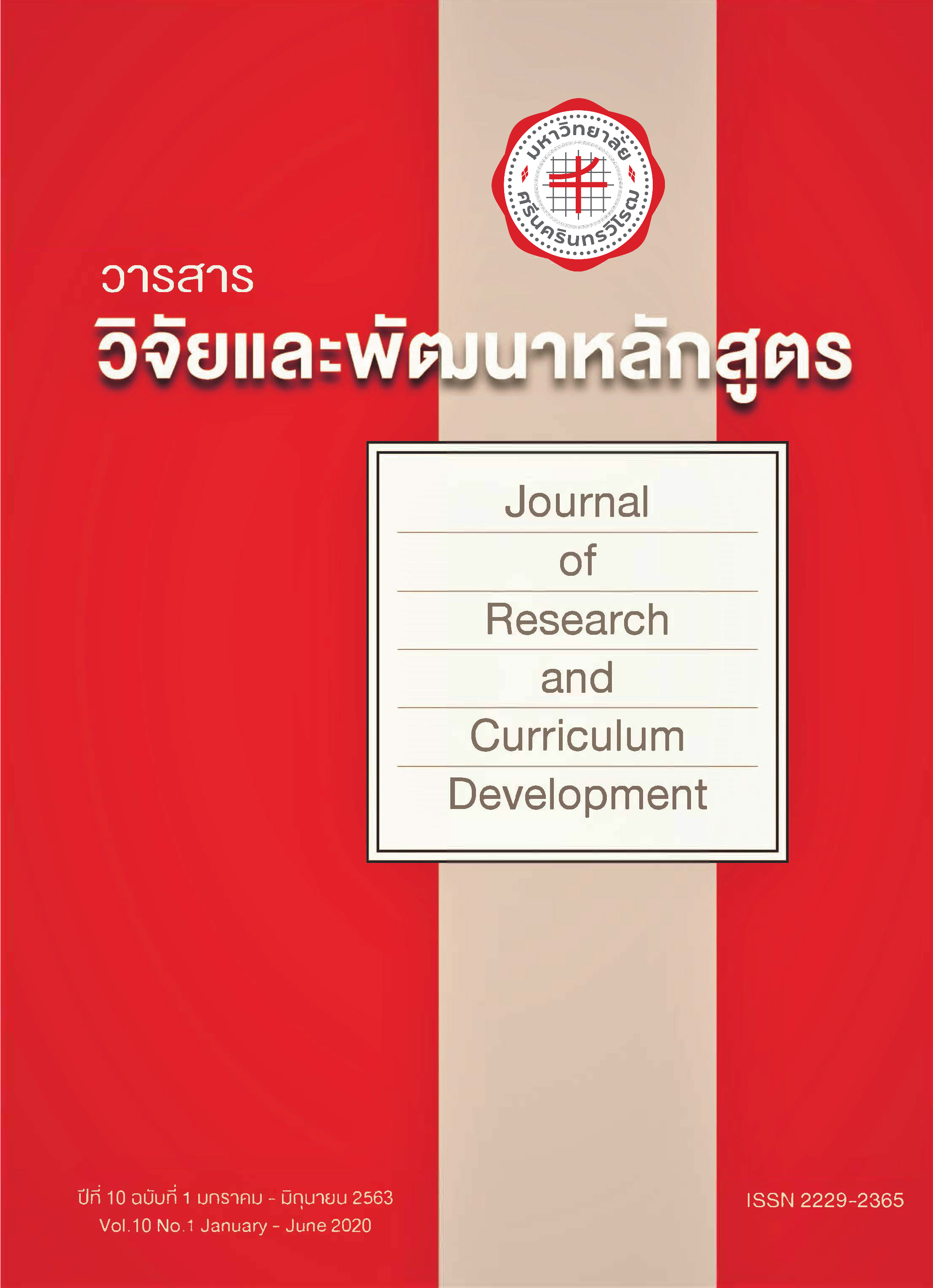การสร้างกระบวนการโค้ชด้วยหลักพุทธธรรมของครูพี่เลี้ยงในโรงเรียนร่วมพัฒนาวิชาชีพครู
Keywords:
Buddhist principles application with the coaching processes, training teachers, performance evaluation form for the pre-service teachers., Coaching, Buddhist principles, Training teachers, Competence performance, Pre-service teachersAbstract
The purposes of the research were: 1) to study the current state and coaching problems of training teachers in the participatory schools and 2) to reinforce coaching processes of the training teachers in in the participatory schools by using Buddhist principles. 3) to evaluate the Buddhist principles application with the coaching processes of the training teachers in the participle schools. The mixed research methods were used in this study. The qualitative data were collected and analyzed from documentary reviews and in-depth interviews with the dean of the faculty of education, school directors, teacher supervisors, training teachers, 10 pre-service teachers and the focus group discussion including 12 experts, and the sampling group of the experimentation were training teachers and 10 pre-service teachers. Researching equipment analysis document, in-depth interviews, Buddhist principles application with the coaching processes manual, Buddhist principles application with the coaching processes for training teacher’s behavior evaluation form and performance
evaluation form for the pre-service teachers. The quantitative data were collected through the current state and coaching problem questionnaires from 381 training teachers in the participative schools by multi-stage random sampling and questionnaires for evaluated the Buddhist principles application with the coaching process from 345 training teachers in the participatory school. The data were analyzed by percentage, frequency, mean, standard deviation, T-dependent and priority needs index. The results of the study were as follows:
- The current state and needs of the coaching processes by using Buddhist principles for the mentor teachers was that coaches should regularly reflect concepts and feedbacks in order to encourage and give trainees an opportunity to question what they mightn’t understand.
- The establishment of the coaching processes by using Buddhist principles for the mentor teachers consisted of 5 components namely 1) coaching objectives, 2) Buddhist principles used for coaching, 3) coaching skills, 4) coaching compassions and 5) Buddhist methods used for coaching. The Buddha’s teaching styles used as a model of coaching were 1) elucidation and verification, 2) incitement to take upon oneself; inspiration towards the goal, 3) encouragement; filling with enthusiasm, 4) gladdening; filling with delight and joy. Therefore, the coaching method was called Buddhist Administrations of Coaching. There was also an integration with The Four sublime states of mind and The Four Bases of Sympathy ; acts of doing favors; principles of service; virtues making for group integration and leadership which were applied in 5 stage namely 1) compassions forming, 2) cooperation for coaching objectives design, 3) coaching operation, 4) review, consideration and reflection of the treatment and 5) results evaluation. The finding of the experiment showed the efficient of the treatment that the mentor teachers and the pre-service teachers participated in using the coaching model more than before using the treatment with 0.05 according to the statistical significance.
- The overall composition of the coaching model examination and evaluation was totally at a high level. In details, the highest level was on usefulness, followed by accuracy, appropriateness and feasibility respectively.
References
ประเทศไทยสู่ความมั่งคั่ง มั่นคง และยั่งยืน. [ออนไลน์]. ค้นเมื่อ ๕ มกราคม ๒๕๖๑, จาก file:///C:/Users/Administrator/Downloads/Documents/Thailand-๔.๐.pd
ฉวีวรรณ สุวรรณาภา ผศ., ดร.อรอนงค์ วูวงศ์,นางสาวพัฒน์นรี อัฐวงศ์, การฝึกประสบการณ์วิชาชีพครูของนิสิต มหาวิทยาลัยมหาจุฬาลงกรณราชวิทยาลัย วิทยาเขตแพร่, รายงานการวิจัย มหาวิทยาลัยมหาจุฬาลงกรณราชวิทยาลัย วิทยาเขตแพร่, ๒๕๕๔.
บุญชม ศรีสะอาด, การวิจัยเบื้องต้น, พิมพ์ครั้งที่ ๕ กรุงเทพมหานคร : สุวีริยาสาส์นการพิมพ์, ๒๕๓๕, หน้า ๙๙.
บุษราคัม ศรีจันทร์. รูปแบบการโค้ชทางปัญญาแบบเพื่อนช่วยเพื่อนเพื่อพัฒนาสมรรถนะการจัดการเรียนการสอนของครูที่ส่งเสริม Metacognitionของนักเรียนในโรงเรียนสังกัดกรุงเทพมหานคร, ดุษฎีบัณฑิต หลักสูตรและการสอน คณะศึกษาศาสตร์ มหาวิทยาลัยศิลปากร, ๒๕๖๐.
พระธรรมกิตติเมธี, ดร.การสนทนากลุ่ม (Focus Group Discussion) ดุษฎีนิพนธ์ เรื่อง การสร้างกระบวนการโค้ชด้วยหลักพุทธธรรมของครูพี่เลี้ยงในโรงเรียนร่วมพัฒนาวิชาชีพครู ณ อาคารเรียนรวมโซนซีชั้น ๕ หลักสูตรพุทธศาสตรดุษฎีบัณฑิต คณะครุศาสตร์ มหาวิทยาลัยมหาจุฬาลงกรณราชวิทยาลัย วันอาทิตย์ที่ ๑ ธันวาคม ๒๕๖๒
มารุต พัฒผล รศ.,การสนทนากลุ่ม (Focus Group Discussion) ดุษฎีนิพนธ์ เรื่อง การสร้างกระบวนการโค้ชด้วยหลักพุทธธรรมของครูพี่เลี้ยงในโรงเรียนร่วมพัฒนาวิชาชีพครูณ อาคารเรียนรวมโซนซีชั้น ๕ หลักสูตรพุทธศาสตรดุษฎีบัณฑิต คณะครุศาสตร์ มหาวิทยาลัยมหาจุฬาลงกรณราชวิทยาลัย วันอาทิตย์ที่ ๑ ธันวาคม ๒๕๖๒
วิลาวัณย จารุอริยานนท. รูปแบบการบริหารจัดการการฝกประสบการณ์วิชาชีพครูเพื่อพัฒนาคุณภาพ ครูยุคใหม. วารสารครุศาสตร์, ๒๕๕๗.
สุชาติ ประสิทธิ์รัฐสินธุ์, ระเบียบวิธีการวิจัยทางสังคมศาสตร์, กรุงเทพมหานคร : สำนักพิมพ์เฟื่องฟ้าพริ้นติ้ง, ๒๕๔๔.
สุภางค์ จันทวานิช, วิธีวิจัยเชิงคุณภาพ, กรุงเทพมหานคร: โรงพิมพ์แห่งจุฬาลงกรณ์ราชวิทยาลัย, ๒๕๔๐.
สุวิมล ว่องวาณิช, การวิจัยประเมินความต้องการจำเป็น, สำนักพิมพ์แห่งจุฬาลงกรณ์มหาวิทยาลัย พิมพ์ที่ : บริษัทวี. พริ้นท์ (1991) จำกัด กรุงเทพมหานคร, ๒๕๕๘.
อารี สัณหฉวี. ข้อคิดบางประการจากการศึกษาดูงานที่ประเทศฟินแลนด์. วิทยาจารย์, ๒๕๕๕.
Erawan, P. A path analysis for factors affecting pre-service teachers’ teaching
efficacy. American Journal of Scientific Research. ๑๓(๒๐๑๑) , ๔๗-๕๘. Retrieved March, ๒๐๑๕, from http://www.eurojournals.com/ajsr.htm.
Chong, S. ; Ee Ling, L. & Kim, C. G. Emerging professional teacher identity of pre-
sevice teachers. Australian Journal of Teacher Education, ๒๐๑๑.





